Key Point #1
College administrators across the country are increasingly requiring ideologically charged “diversity statements” from faculty applicants as a way to suppress the hiring of politically independent or conservative candidates.
Key Point #2
At Arizona’s public universities, up to 80% of faculty job openings now force applicants to pledge support for progressive, racialized notions of “diversity, equity, and inclusion” and CRT-based terminology such as “intersectional personal identities” in order to be hired.
Key Point #3
The Arizona Board of Regents and/or state lawmakers must prohibit this practice to restore the ideological neutrality of taxpayer funded universities and restore compliance with the state constitution’s ban on political tests.
Foreword
Jonathan Butcher is a senior fellow at the Goldwater Institute and an education fellow at The Heritage Foundation
Now that public colleges and universities have spent years and millions of taxpayer dollars promoting diversity, equity and inclusion (DEI), we have to ask: Is it working?
Do DEI offices really make campuses feel more inclusive to all students, regardless of ethnicity or opinions?
Provide equal access to school resources and activities?
Create a school culture that welcomes people with different experiences and ideas?
The answer to all three is a clear “no,” as evidenced by surveys asking students how they feel about sharing their opinions on campus. According to the most recent Campus Expression Survey conducted by Heterodox Academy, 60 percent of students surveyed “expressed reluctance to discuss at least one controversial topic (i.e., politics, religion, race, sexual orientation, and gender).[1] Approximately 40 percent of students are afraid to discuss politics at their school and some 30 percent are fearful to discuss religion. At least one in four students was reluctant to discuss race in last year’s survey and this year’s survey. Sixty-three percent of students “agreed that the climate on their campus prevents people from saying things that they believe.”
These responses are not unique. A Knight Foundation survey of college students from 2020 found that 76 percent of respondents said school diversity programs “frequently” or “occasionally” will “come into conflict with free speech rights.”[2] Similar to the Heterodox survey, 63 percent of students in the Knight Foundation report said “the climate on their campus deters students from expressing themselves openly.”
DEI programs and “statements” do not produce free expression nor more diversity of thought, equal opportunities, and a culture that includes everyone in school activities because DEI’s guiding principles are rooted in the racially discriminatory worldview known as critical race theory. As this Goldwater Institute report uncovers, DEI programs on college campuses simply apply critical race theory’s elements of intersectionality and identity politics and more to campus life.
Critical race theory is not merely an academic theory meant to help people understand race—it is an applied ideology that is suspicious of rights and “questions the very foundations of the [classical] liberal order, including equality theory…and the neutral principles of constitutional law.”[3] Critical race theory traces its origins to other “critical” theories including critical legal theory and the original, neo-Marxist “critical theory.” Theorist Kimberlé Crenshaw, who originated critical race theory’s concept of intersectionality, says the first meetings of professors and writers who designed critical race theory were “organized by a collection of neo-Marxist intellectuals, former New Left activists, ex-counter-culturalists, and other varieties of oppositionists in law schools.”[4]
“The goal,” writes critical legal theorist Duncan Kennedy, whose ideas inspired critical legal theory, “is to replace the system, piece by piece or in medium- or large-sized blocks with a better system” based on Marxism.[5]
The theorists wanted to spread disruption through institutions of higher education. Former Harvard professor and critical race theorist Derrick Bell said, “Most critical race theorists are committed to a program of scholarly resistance that they hope will lay the groundwork for wide-scale resistance.”[6]
Clearly DEI does not promote diversity, equity, and inclusion because that was not critical theorists’ goal. This Goldwater Institute report explains that DEI has become institutionalized on Arizona college campuses: you must consent to the prevailing “woke” orthodoxy to be hired by a state university, which guarantees that students have little choice but to be taught by professors who have committed to a radical agenda.
This report should be a wake-up call to lawmakers, as well as students and families and the state board of regents. Not only are schools saturated in the DEI dogma but this dogma has no intent on restoring free expression on campus nor will DEI make postsecondary institutions places that allow for the pursuit of truth. Policymakers must heed the enclosed policy recommendations or risk “laying the groundwork for widescale resistance” to the precious ideals of diversity of thought, equality of opportunity, and the inclusion of everyone who believes that education can make the American Dream possible for them.
Introduction
Teachers are entitled to freedom in the classroom in discussing their subject, but they should be careful not to introduce into their teaching controversial matter which has no relation to their subject.
—1940 Statement of Principles on Academic Freedom and Tenure, American Association of University Professors and the Association of the American Colleges[7]
As perhaps the nation’s most ardent proponents of academic freedom, the American Association of University Professors (AAUP) has long cautioned against using that freedom as license to hijack the academic focus of classroom instruction. As the AAUP itself has clarified of its proclamation, “The intent of this statement is not to discourage what is ‘controversial.’ Controversy is at the heart of the free academic inquiry which the entire statement is designed to foster. The passage serves to underscore the need for teachers to avoid persistently intruding material which has no relation to their subject.”[8]
Unfortunately, the intrusion of unrelated political content has now become a mainstay of America’s higher education institutions, with both students and faculty pressured into incorporating left-wing political orthodoxy into their scholarship. Perhaps nowhere is this clearer than in the demands now being placed upon current or prospective faculty members to submit declarations of support for so-called “diversity, equity and inclusion (DEI)” initiatives, which a growing number of scholars have noted function as political screening tests. While these scholars have sounded the alarm nationally over the use of these “diversity statements”—which have been found to eliminate up to three quarters of potentially qualified applicants regardless of their academic merits—this report catalogues the extent to which they have been deployed specifically in Arizona’s public university system. Among its key findings, this report documents the following:
- As of fall 2022, Arizona’s public universities now mandate diversity statements from applicants in over a quarter (28%) of job postings at the University of Arizona, nearly three-quarters (73%) of job postings at Northern Arizona University, and in more than four of five (81%) job postings at Arizona State University.
- Northern Arizona University’s Diversity Strategic Plan calls for the university to dramatically scale up the use of DEI statements to make them a universal feature of the hiring process for all administrator, faculty, and designated professional and staff positions.
- Diversity statement practices in Arizona’s public universities include replacing the traditional cover letter with a DEI statement and forcing candidates to provide up to two full pages detailing their activism or commitment to the DEI regime.
- Arizona’s universities now require diversity statements from candidates in such specialized research areas as “ultra-bright nano-structured photoemission electron” studies.
- University guidelines explicitly call on applicants to utilize the language of critical race theorists when drafting their required diversity statement, recommending candidates share “Your understanding/articulation of the role played by intersectional personal identities”—a framework pioneered by CRT scholar Kimberlé Crenshaw.
- Arizona’s universities appear to be using DEI statements in an attempt to circumvent the state’s constitutional prohibition against political litmus tests in public educational institutions.
- The Goldwater Institute recommends that the Arizona Board of Regents (ABOR) protect faculty, students and applicants from these tests by prohibiting their use in university operations, and/or that state lawmakers enact a statutory remedy based on the institute’s model legislative solution.
Arizona is by no means alone in its expansive adoption of DEI statements in higher education, and there is evidence that the findings from the Arizona university system are indeed true of other university systems across the nation. Regardless of the state, it is essential that those entrusted with the stewardship of America’s higher education institutions put an end to all mandatory political litmus tests in public education, with special emphasis upon the use of diversity statements.
The Rise of Diversity Statements
It is no secret that the membership of American academia skews heavily leftward on the political spectrum. Reports from the Higher Education Research Institute at UCLA indicate that just 12% of college or university professors identified as conservative nationwide as of 2017, compared to 60% who identified as far left or liberal.[9] This ideological imbalance has likely only worsened in the years since.
Numerous scholars within academia have called attention to the negative effects that such a politically monolithic atmosphere has on their respective disciplines,[10], [11], [12] and some—like the Heterodox Academy—have even made attempts to encourage greater intellectual and political diversity within research and teaching fields. Unfortunately, the current imbalance and the hostility to right-leaning viewpoints found among many institutions of higher education may actually intensify rather than improve because of new practices being deployed at colleges and universities around the country.
In general terms, the problem is that a large number of colleges and universities nationwide are actively screening out prospective candidates who are insufficiently aligned with left-leaning causes. Specifically, these institutions now regularly evaluate current or potential professors and instructors based on whether or not they endorse a particular view on diversity, equity, and inclusion or can show proof of having actively furthered that view in their careers and personal lives. For example, job postings will call for variations of the following: “A statement regarding the candidate’s views on diversity, inclusion, and equity, including past and current contributions as well as their vision and plans in these areas.” These requirements are broadly known as Diversity, Equity, and Inclusion (DEI) Statements—or simply diversity statements.
In general terms, the problem is that a large number of colleges and universities nationwide are actively screening out prospective candidates who are insufficiently aligned with left-leaning causes.
DEI statements sometimes manifest as a one-paragraph formality within a cover letter, while other postings have called for up to two full pages of activist history and plans for the future. What these statements are not is a quick affirmation that one will comply with federal anti-discrimination law. They are often looking for a full-throated endorsement of leftist notions on race, gender, and sex—including the rejection of America’s colorblind legal framework. Moreover, these statements are not optional add-ons to simply boost one’s application. In the University of California system—where the use of diversity statements has been fully embraced[13]—candidates’ job applications have been thrown out before being read if they did not have a diversity statement attached. At UC Berkeley, over 75% of applications were discarded for not including enough to satisfy the DEI regime, regardless of the candidates’ academic merits.[14]
A handful of national outlets have taken note of this practice: the National Association of Scholars’ John Sailer, for instance, has warned of the extraordinary spread of DEI statements nationwide,[15] while scholars at Reason have observed that UC Berkeley’s “diversity rubric” has helped reject all applicants who do not score high enough on DEI measures.[16] Meanwhile other academics via the The American Mind have called for DEI statements to be prohibited in the hiring process.[17]
Perhaps most significantly, in November 2021, the American Enterprise Institute (AEI) analyzed the prevalence of DEI statement requirements in university hiring practices across the country and estimated that nearly 1 of every 5 job postings (19%) required a diversity statement.[18] As AEI’s scholars acknowledged, however, that estimate likely substantially underestimated the prevalence of DEI statements because AEI’s count included only postings that used the word “diversity” rather than asking for discussions of anti-racism or equity. Moreover, AEI’s review was limited to postings within six academic disciplines (albeit popular ones, such as history, mathematics, and business).
Recent Developments in Arizona
To build upon such analyses and assess the full impact of DEI statements in one state in particular—Arizona—the Goldwater Institute has surveyed listings of the state’s three public universities across all disciplines. A raw count of every job posting for full-time faculty at each primary campus of Arizona’s three major universities has revealed the problem has worsened significantly in the year since AEI conducted its research at the national level.
As a backdrop, initiatives to enhance DEI agendas have long occupied the fringes of academia, but in response to the unrest following the killing of George Floyd by police in 2020, student groups were able to force the hand of administrators into making greater commitments in the name of diversity. The president of Arizona State University (ASU) issued a statement promising a college-by-college review of systems and the establishment of new offices to be filled with administrators charged with increasing diversity.[19] At the University of Arizona (UA), the Office of Diversity and Inclusion received an expanded mandate to work within each and every college, administrative unit, and division.[20] At Northern Arizona University (NAU), a new Diversity Strategic Plan (DSP) was announced for fall 2020 with a series of university-wide priorities.[21]
Northern Arizona University
When it comes to the issue of mandatory DEI statements, NAU’s DSP is the most transparent. Under the plan’s third priority statement, the school planned to “Require a statement on diversity and inclusion for applicants for all administrator, faculty, and designated professional and staff positions (fig. 1).” From an inspection of current job postings, this has not yet been implemented across every department at NAU, though certainly a large number are already complying with the DSP.
Figure 1
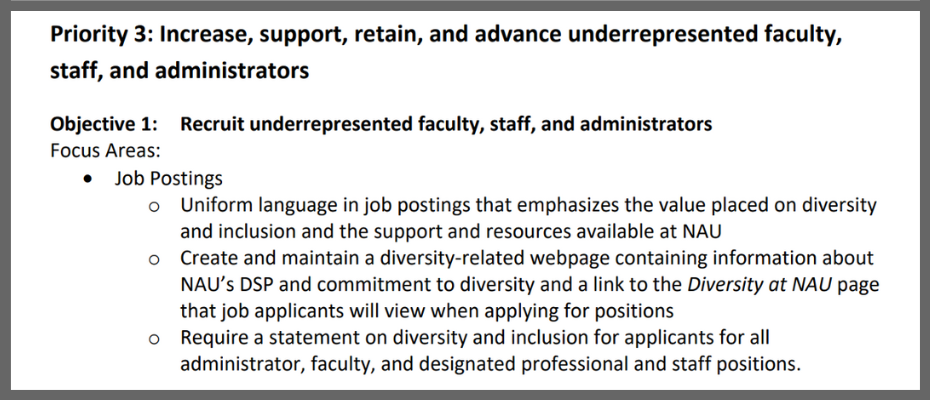
For example, in fall 2022, NAU launched a search for a non-tenure track assistant teaching professor in mechanical engineering with a required diversity statement, while also seeking a geographer of similar rank with a request for “a statement of teaching philosophy including evidence of teaching effectiveness or interest and commitment to diversity and inclusion (recommended two pages) (fig. 2).” A two-page statement of fealty to DEI ideology may seem unnecessary to teaching geography, but not in the eyes of NAU’s diversity apparatus.
Figure 2

Moreover, as evidence of the accelerating implementation of DEI statement requirements, sometime between September 2022 and October 2022, campus administrators added a new page to the university’s website that proclaims NAU a “True Diversity University” and explains how to craft a diversity statement under a newly expanded “DEIJ” acronym (now with justice added). This page was linked to by the eight most recent job postings as of October 17, 2022.
As shown in Figure 3, for instance, the job posting for a German foreign language position posted in fall 2022 now featured a more standardized DEIJ statement requirement with a link to the new diversity diktats, as shown in Figure 4.
Figure 3

Figure 4
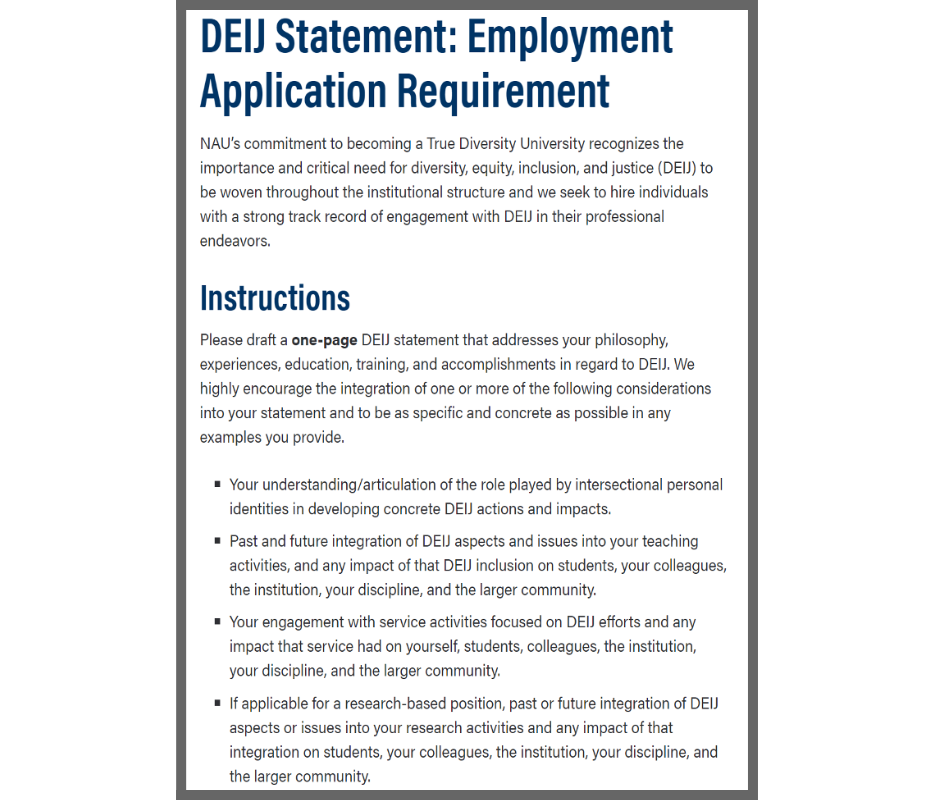
Perhaps even more strikingly, NAU’s DEI instructions explicitly call on applicants to utilize the language of critical race theorists when drafting their required diversity statement. Indeed, the first recommendation in NAU’s guidelines is to share “Your understanding/articulation of the role played by intersectional personal identities in developing concrete DEIJ actions and impacts” (emphasis added) (fig.4). As The Association of American Law Schools has noted, critical race theory (CRT) scholar “Professor [Kimberlé] Crenshaw coined the term “intersectionality,” [and] developed the framework for critical race theory.”[22] Crenshaw’s own Columbia faculty page likewise celebrates that her “work has been foundational in critical race theory and in ‘intersectionality,’ a term she coined.”[23] NAU’s solicitation that candidates discuss the role of “intersectional personal identities” thus reveals the intent of the universities’ diversity statement requirements and suggests that all prospective university hires may be judged by their support (or lack thereof) for one particular, activist-oriented, ideological framework.
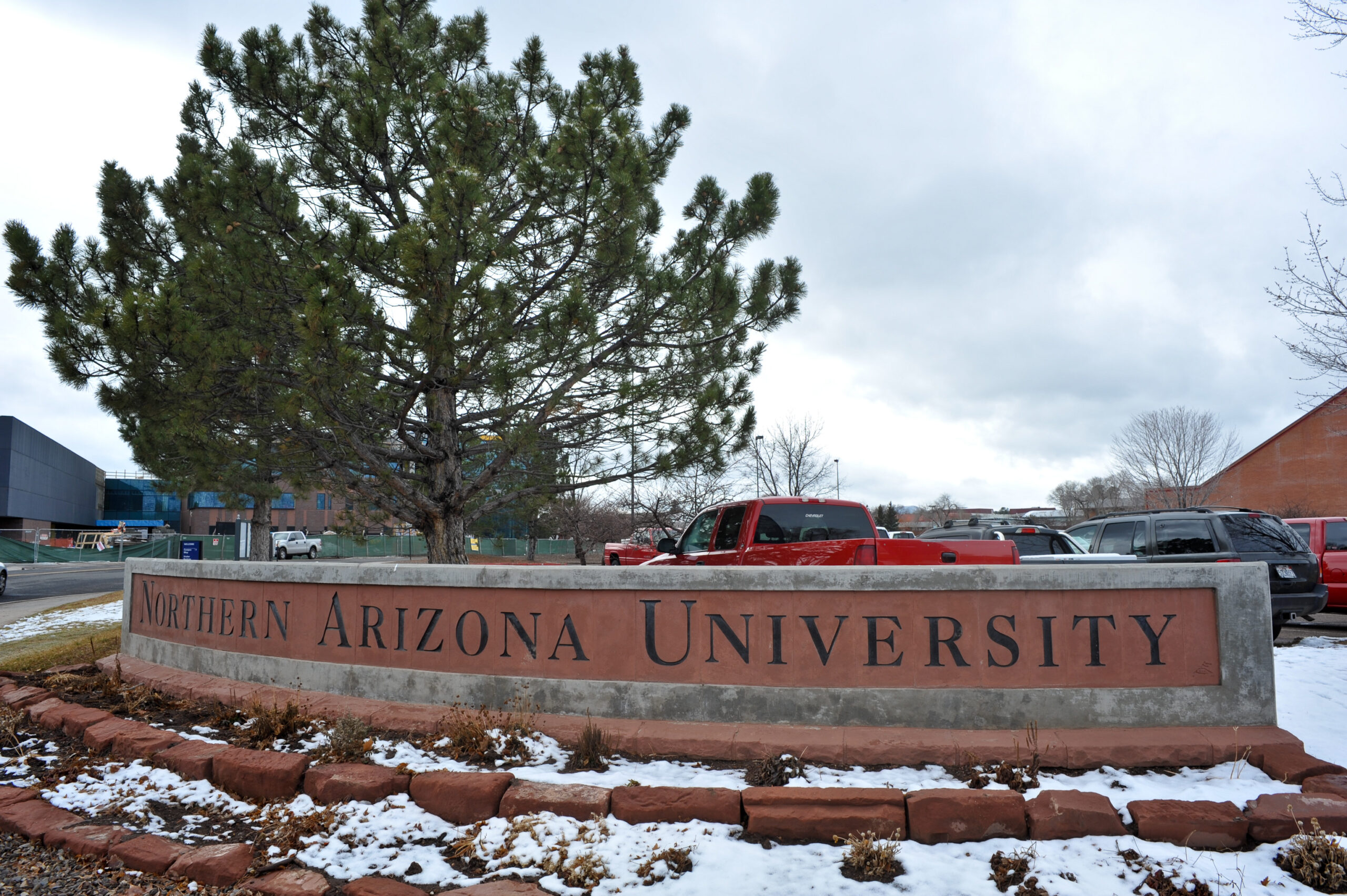
Arizona State University
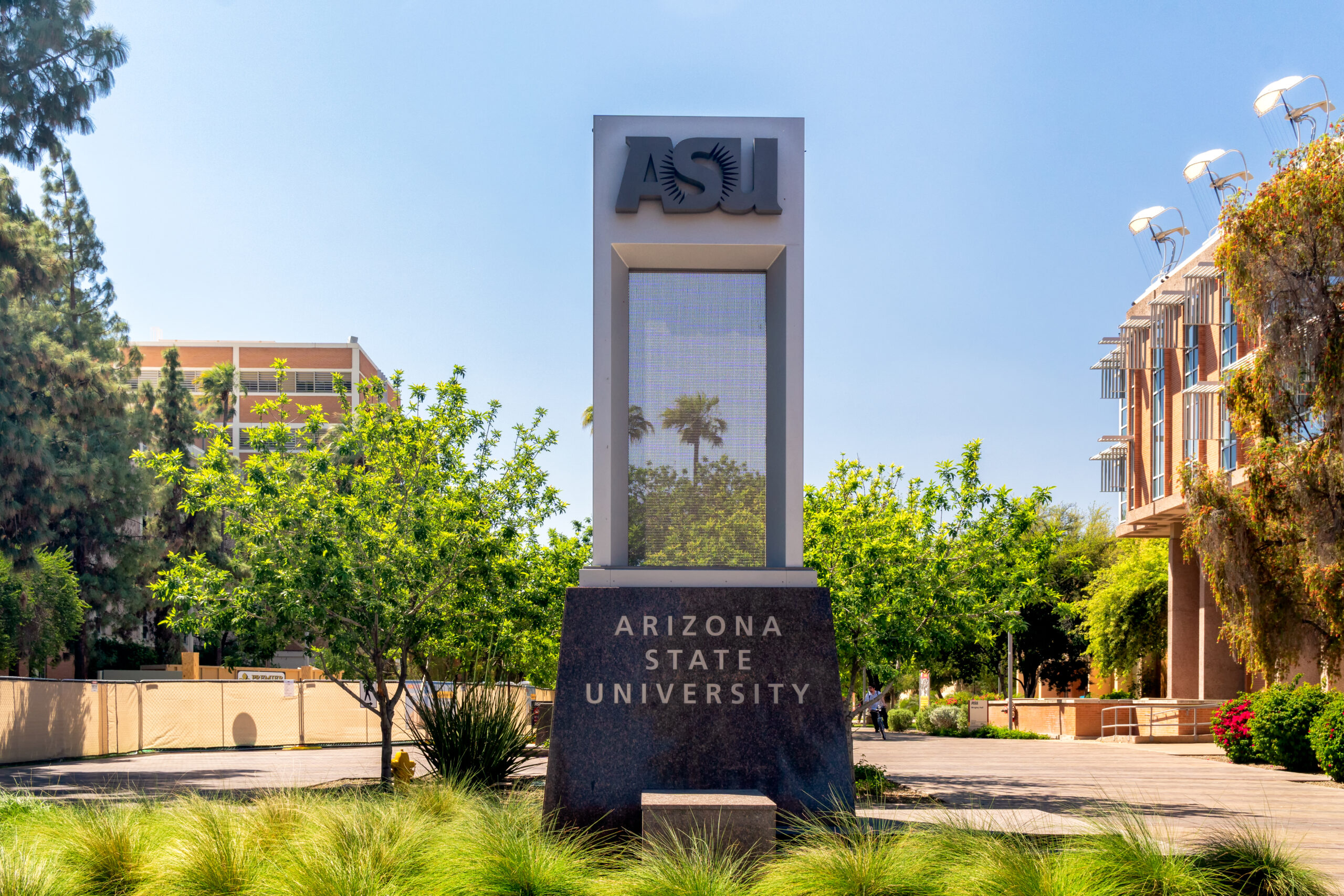
In September 2021, ASU’s Office of Inclusion and Community Engagement released the LIFT report,[24] a catalog of the new initiatives the university was undertaking and the progress made on its DEI goals. Tucked onto page 34 of the report, the administrators announced the change in university hiring protocols, saying “DEI principles are being integrated into all campus search committees’ hiring practices (fig.5).” This is a vague statement, but the effects can be seen in the required DEI statement on a large proportion of job postings. Even for roles that are purely research positions without teaching or administration duties, DEI statements are being required.
Figure 5
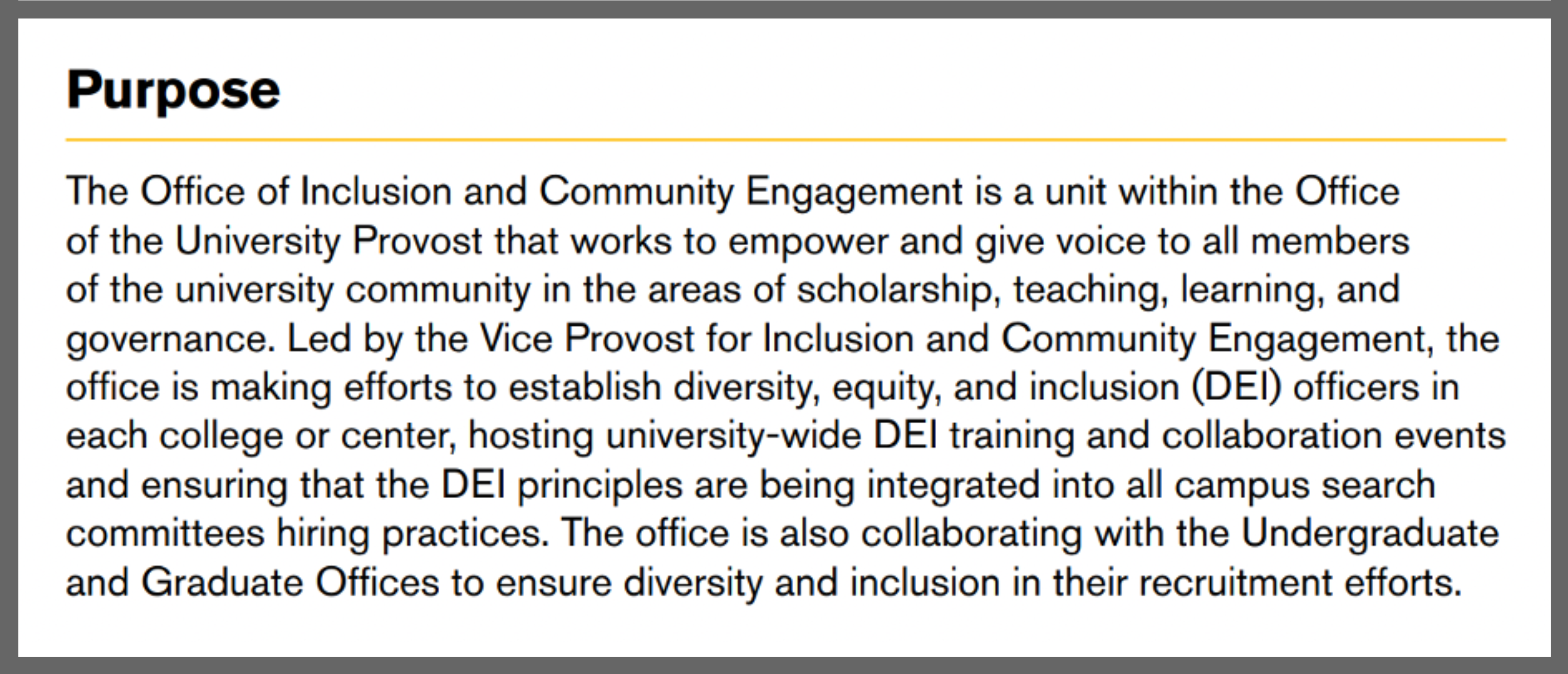
The Melikian Center for Russian, Eurasian, and East European Studies, for instance, was recently searching for a postdoctoral fellow to research and write (and not teach) on post-Soviet migrations in eastern Europe. Within their application requirements was “a statement addressing how your past and/or potential contributions to diversity and inclusion will advance ASU’s commitment to inclusive excellence (fig. 6).” Perhaps more strikingly, ASU’s department of physics launched a fall 2022 search for a postdoctoral research fellow to help develop “ultra-bright nano-structured photoemission electron sources,” requiring any applicant for the job to provide a statement on how their past actions and future plans will help further ASU’s diversity commitments (fig. 7).
Figure 6
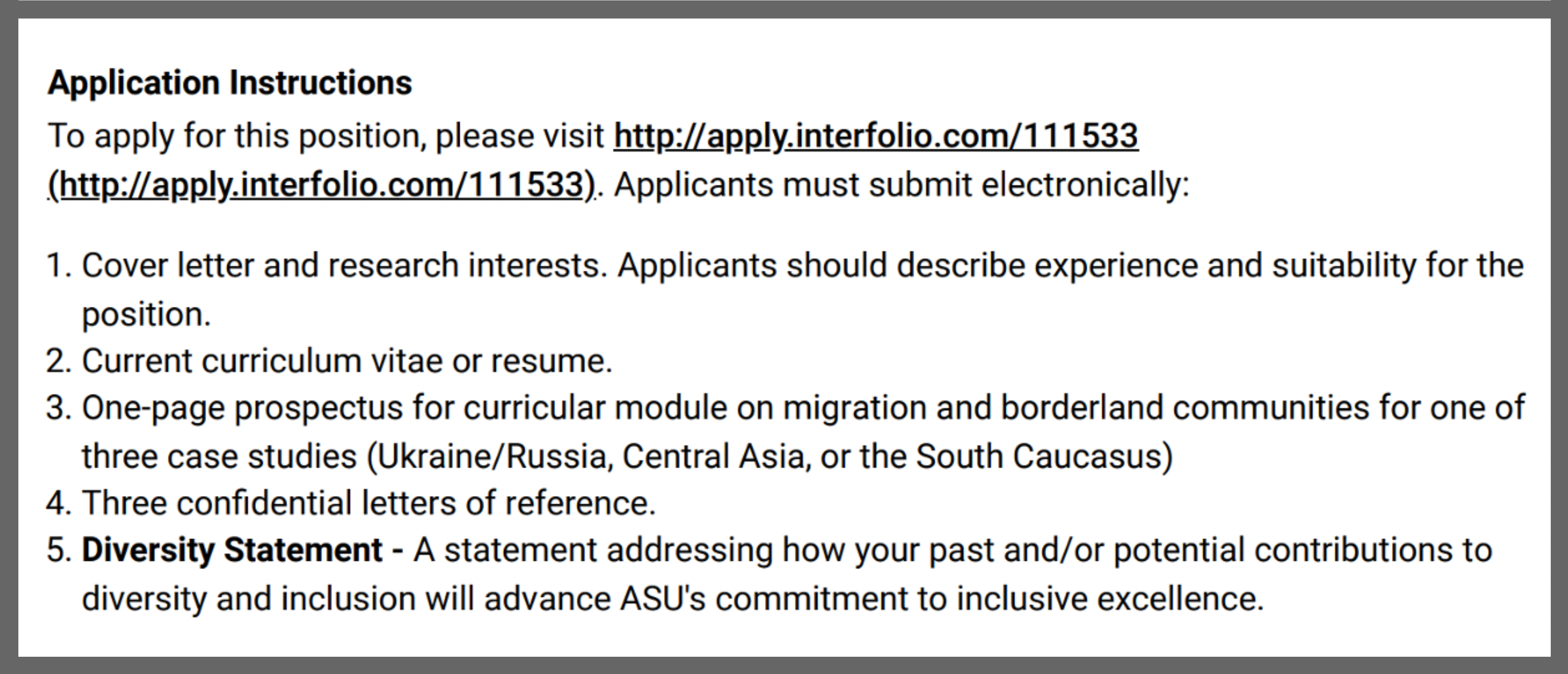
Figure 7
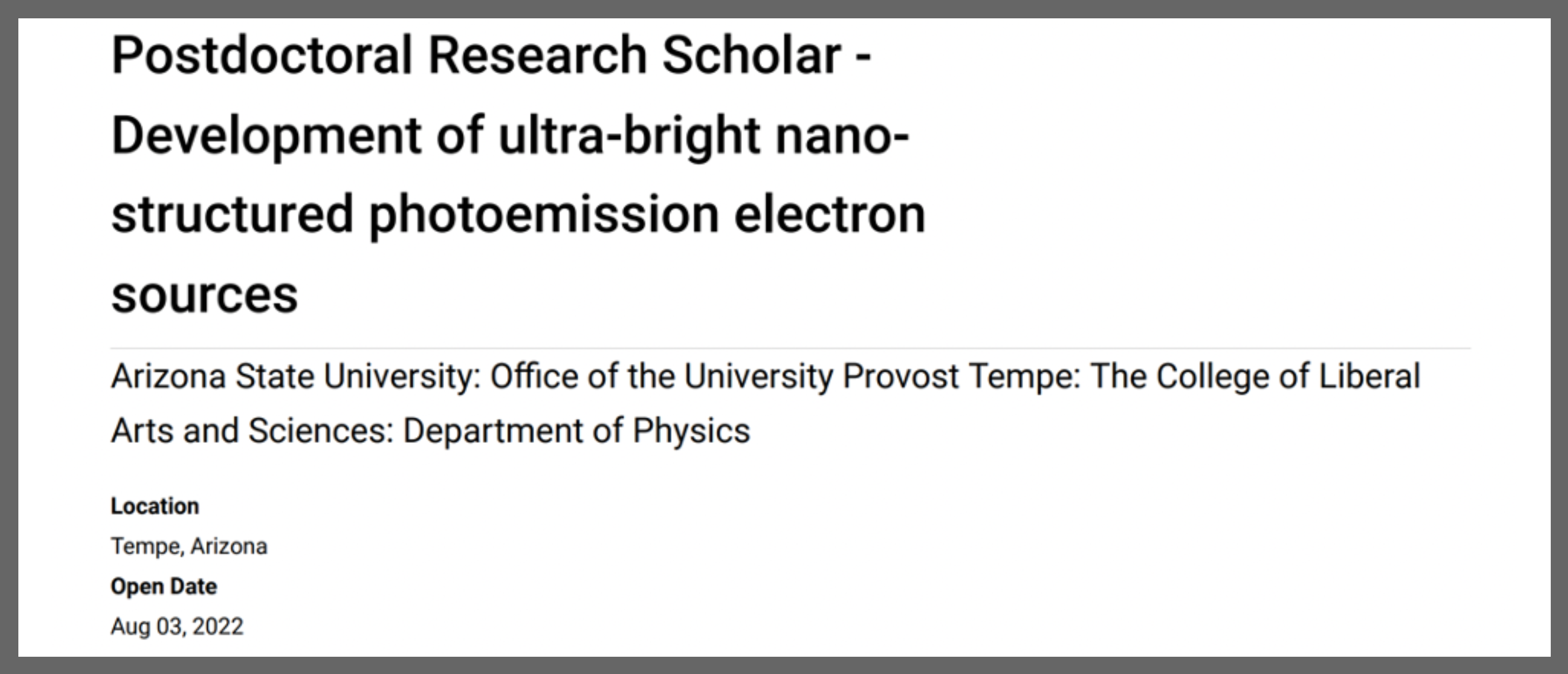

University of Arizona
The University of Arizona offers less publicly accessible information on exactly what the Office of Diversity and Inclusion has changed at the school, but DEI statements in faculty hiring again appear relatively common. For an assistant professor position teaching molecular biology (fig. 8), for instance, applicants are asked to provide a statement “describing the candidate’s personal philosophy on classroom inclusiveness and how the candidate will exhibit the philosophy in the classroom.” Yet even more extraordinary—and as further evidence that the DEI regime is replacing, not simply skewing the standard measures of candidate quality—this posting specifically requests a minimum of 500 words on the subject and asks this be the cover letter. It is not a supplement to the cover letter, rather the cover letter itself, and must be devoted to the topic of inclusiveness.
Figure 8

The examples highlighted from each of the universities were selected to demonstrate how deeply DEI mandates have reached even into fields typically safe from political radicalism. Perhaps few would be surprised at DEI statements proliferating within typically left-leaning gender or ethnic studies departments. But to make them a prerequisite to teach mechanical engineering or study advanced physics strains any plausible academic justification.
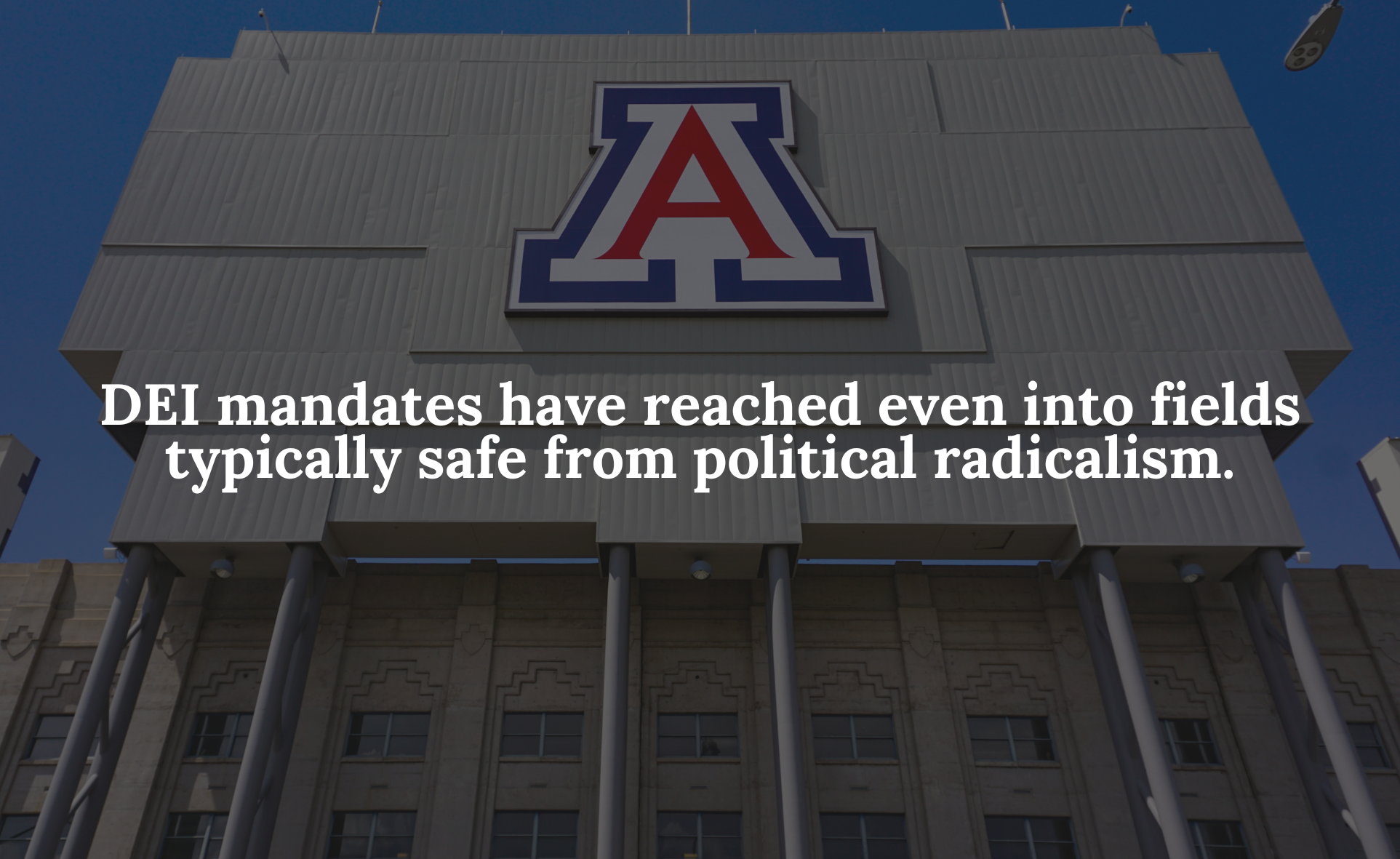
Systemic Failure in Arizona
The instances above offer a sobering portrait of the state of Arizona’s public university system. Yet nothing illustrates the extent of the problem better than a full survey of job postings. As such, in the first half of October 2022, Goldwater staff conducted a review of the prevalence of diversity statements at every full-time faculty job posting open at the time at the main campuses of ASU, UA, and NAU (fig. 9). The least egregious was UA, whose Tucson campus required diversity statements in 25 out of 90 job postings, or 28%. NAU had 33 job postings, of which 24, or 73%, required DEI statements. Finally, ASU had 118 job postings for the Tempe campus, and 96 of them, or 81%, required diversity statements.
In its fall 2021 analysis, AEI had observed that colleges in the Southwest had slightly fewer job postings with required DEI statements than the national average.[25] This updated review of Arizona’s university system thus marks a drastic change in just a year’s time, and it far exceeds the estimate of 19% of university faculty positions nationwide. In short, it is clear that new DEI initiatives intend to overhaul the hiring process for every position at Arizona universities.
Figure 9
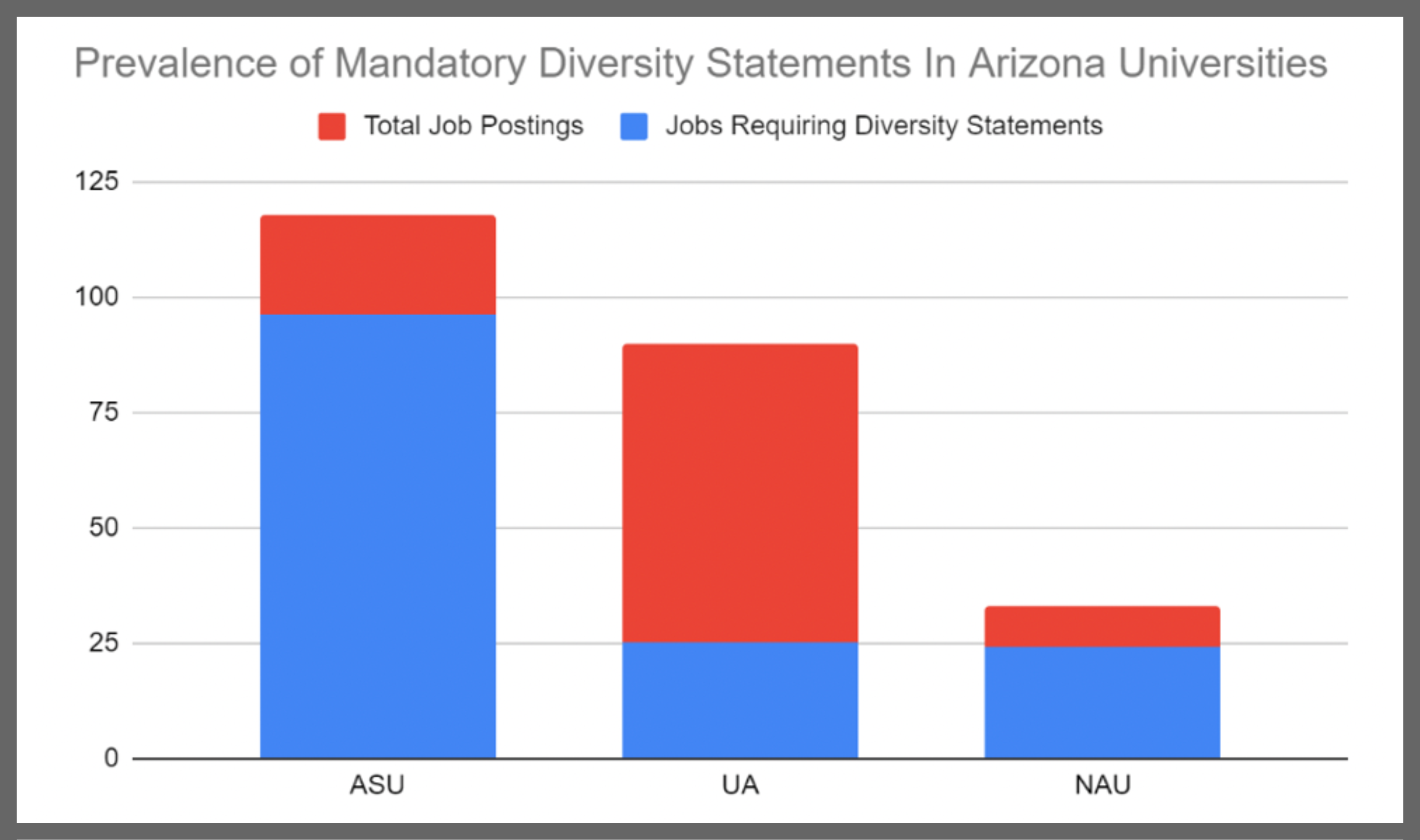
The Corrosive Impact of DEI Statements
DEI requirements present a threat to the health of Arizona’s university system—and by extension, the state at large. Universities exist to promote academic inquiry in search of the truth. Requiring dogmatic adherence to DEI’s politicized ideologies to advance or even start a career at a university threatens to quickly destroy meaningful truth-seeking within those institutions. Scholars such as Jonathan Haidt, social psychologist at New York University, have condemned the use of DEI statements when used, for instance, as a prerequisite to submit research at the Society for Personality and Social Psychology, a professional society for social psychologists. Despite his own self-described moderately left-leaning political views, Haidt concluded he needed to resign from the society rather than support its demands that members affirm the DEI dogma.[26] Academics looking to advance under a university’s DEI regime will likewise increasingly have to either contort their research interests to fit within DEI frameworks or else abandon their niche interests to satisfy the new demand to work on so-called diversity, inevitably constricting the growth of human knowledge.
Of course, universities’ academic quality is not the only casualty of DEI regimes. NAU, for example, is already committed to ensuring that every applicant for any academic position at the university first pledge their commitment to the DEI ideology. Freedom of speech is meaningless without the equal freedom to not speak when one desires to be silent. For a public institution to require what is in essence a loyalty oath to a progressive political vision is to rob citizens of their rights. This will affect not only conservative professors and researchers, but also alienate those with libertarian leanings, moderate or classical liberals, and those who have simply not engaged on polarizing issues of gender and race studies. Again, requiring DEI statements goes beyond complying with non-discrimination law. At the Department of Educational Policy Studies and Practice at UA’s College of Education, for instance, administrators have wholeheartedly embraced DEI statements and describe their existing faculty as “scholar-activists.” Unfortunately, this is precisely the sort of candidate DEI statements are meant to exclusively cultivate: someone who will comply with and advance progressive goals of left-wing political activism. If a candidate were to demonstrate insufficient support or dissent, that is a demerit on their application.
In addition, given the way many DEI statement requirements are worded, successful applicants may be increasingly limited to individuals who not only believe in the political tenets of the DEI regime, but who have also actively worked to further DEI goals before applying. Consider the outcome of a hiring decision between two biology professor candidates: Candidate A, a first-generation college graduate who worked multiple jobs over the years to help pay for her degrees—leaving little time for participation in volunteer activism or political organizing; versus Candidate B, whose family wealth or financial aid allowed him to devote his free time as a student to pursuits like attending Black Lives Matter protests. If Arizona universities followed the model of UC Davis, Candidate A would be immediately disqualified and her resume would go unread. Not only is that a poor approach to identifying the most qualified candidate, it can easily work against true diversity by ensuring anyone without a documented history of political activism is kept out of their chosen area of study. Requiring DEI statements palpably distorts the playing field as it chiefly advantages those with spare resources and time to spend on politically charged extracurriculars.
Freedom of speech is meaningless without the equal freedom to not speak when one desires to be silent. For a public institution to require what is in essence a loyalty oath to a progressive political vision is to rob citizens of their rights.
Lastly, it is worth noting the largest group affected by mandates such as DEI statements is the students. Pedagogically, learning each subject only after it has been contorted to pass through a paradigm typically aligned with critical theory creates massive blind spots and also supports research methods lacking in rigor and replicability. In the social sciences, there looms a replication crisis in which only about 40% of major psychological and sociological findings can be reproduced in subsequent studies.[27] Academia has failed to explain this phenomenon, but it is likely that authors’ methods and biases are scrutinized before publication and discarded if their conclusions are deemed politically undesirable. Training new researchers without any exposure to alternate ways of thinking will only exacerbate this issue.
Further, the chilling effect on professorial speech and inquiry will inevitably extend to students. Students who are not fully committed to progressive ideologies will either have to actively seek self-censoring dissidents to be their mentors or operate in near total academic isolation within their university.
Legal Challenges
Ideally, simply bringing enough attention to this problem would prompt university presidents to reconsider the policies their institutions are operating under. Unfortunately, given the active support for DEI-related measures from the universities’ administrations, Arizonans must weigh other alternatives to rein in and restore the integrity of their public universities.
First, DEI statements risk violating the First Amendment. Supreme Court precedent has already repudiated various forms of compelled speech, including the loyalty oaths instituted during the mid-20th century.[28] Such oaths were struck down for unconstitutionally compelling speech, chilling future speech, and relying on vague standards whose punishment for noncompliance could come with no warning. While DEI statements are not delivered as a binding oath under penalty of perjury, they risk going beyond the right of an employer to maintain a standard of employee conduct—they reach into the personal lives and opinions of academics, a realm protected by the First Amendment.[29]
The Arizona Constitution…makes clear that the state’s public educational institutions should not be requiring job applicants to disclose their previous political conduct or their views on highly contested and polarizing ideologies as a prerequisite to employment or advancement.
Professorial freedom is protected by more than the federal government, however. Regardless of whether the First Amendment is invoked to condemn forced diversity statements by current or prospective university faculty, the Arizona Constitution provides even more explicit protections. Article 11, section 7 of the Arizona Constitution states that “no religious or political test or qualification shall ever be required as a condition of admission into any public educational institution of the state, as teacher, student, or pupil.” Going beyond the baseline of federal discrimination law and free speech jurisprudence, this state-level provision makes clear that the state’s public educational institutions should not be requiring job applicants to disclose their previous political conduct or their views on highly contested and polarizing ideologies as a prerequisite to employment or advancement.
Yet, by stopping short of requiring candidates to identify explicitly partisan preferences, university administrators have attempted to skirt the intent of this constitutional safeguard.
The Goldwater Institute’s Recommendation
To address this problem, the Goldwater Institute has collaborated with partner organizations, including the James G. Martin Center for Academic Renewal and Stanley Kurtz of the Ethics and Public Policy Center, to promote legislative models to put an end to all mandatory political litmus tests in public education, with special emphasis upon the use of diversity statements. This legislation will ensure the following:
- Public educational institutions will be explicitly prohibited from using political tests to screen out applicants in any admissions, hiring, or promotion-related decision or from granting preferential consideration to applicants for their support of partisan, political, or ideological beliefs
- Prohibited actions will include compelling or soliciting an applicant, teacher, employee, or pupil to discuss their allegiance to any political ideology or movement—including any ideology that promotes differential treatment on the basis of race or ethnicity.
Arizona’s public universities must revert to being accessible to heterodox thinkers and must make explicit that academic freedom will be protected in Arizona. Educators should not be forced to volunteer their personal opinions on controversial issues to satisfy the initiatives of unelected bureaucrats simply to work in a university. Students, meanwhile, deserve access to the best educators with a myriad of views, not forced ideological homogeneity in service of progressive political causes. The Arizona Board of Regents, or the state’s elected officials, must step in to ensure they have it.
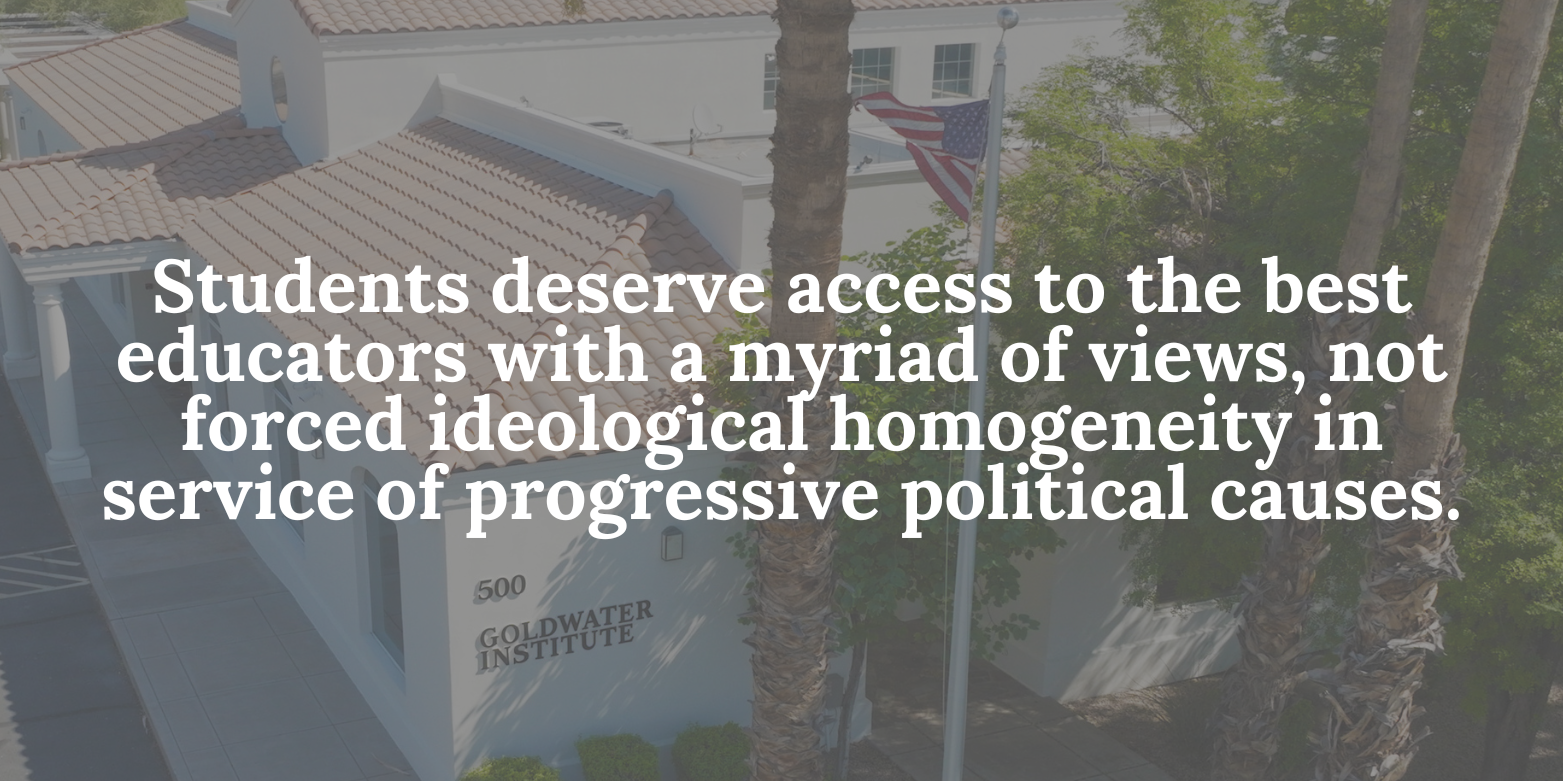
To download the print version of this report click here.
End Notes
[1] Zhou, S., Stiksma, M., & Zhou, S. C. (2022). Understanding the Campus Expression Climate: Fall 2021. Heterodox Academy.
[2] Knight Foundation, “The First Amendment on Campus 2020 Report: College Students’ Views of Free Expression,” 2020, https://knightfoundation.org/wp-content/uploads/2020/05/First-Amendment-on-Campus-2020.pdf.
[3] Richard Delgado and Jean Stefancic, eds., Critical Race Theory: An Introduction, (New York: New York University Press, 2001), p. 3.
[4] Kimberlé Crenshaw, et al, eds., Critical Race Theory: The Key Writings that Formed the Movement (New York: The New Press, 1995), p. xvii.
[5] Duncan Kennedy, excerpt of Left Legalism/Left Critique (Durham, NC: Duke University Press, 2002), http://www.duncankennedy.net/documents/the%20Critique%20of%20Rights%20in%20cls.pdf.
[6] Derrick A. Bell, “David C. Baum Memorial Lecture: Who’s Afraid of Critical Race Theory?” University of Illinois Law Review (1995), p. 900, http://publish.illinois.edu/lawreview/archives/volume-1995/.
[7] 1940 Statement of Principles on Academic Freedom and Tenure, American Association of University Professors and the Association of American Colleges, https://www.aaup.org/file/1940%20Statement.pdf.
[8] 1940 Statement of Principles.
[9] Samuel J. Abrams and Amna Khalid, “Are Colleges and Universities Too Liberal? What the Research Says About the Political Composition of Campuses and Campus Climate,” American Enterprise Institute, October 21, 2020, https://www.aei.org/articles/are-colleges-and-universities-too-liberal-what-the-research-says-about-the-political-composition-of-campuses-and-campus-climate/.
[10] Chris Martin, “How Ideology Has Hindered Sociological Insight, Summarized,” Heterodox: the Blog, September 21, 2015, https://heterodoxacademy.org/blog/how-ideology-has-hindered-sociological-insight-summarized/.
[11] Nicholas Quinn Rosenkranz, “Intellectual Diversity in the Legal Academy,” Harvard Journal of Law and Public Policy, January 26, 2014, https://papers.ssrn.com/sol3/papers.cfm?abstract_id=2385808.
[12] John Tierney, “Social Scientist Sees Bias Within,” The New York Times, February 7, 2011, https://www.nytimes.com/2011/02/08/science/08tier.html.
[13] University of California, Office of the President, “Evaluating Contributions to Diversity for Faculty Appointment and Promotion Under APM-210,” February 2017, https://www.ucop.edu/faculty-diversity/policies-guidelines/eval-contributions-diversity.pdf.
[14] Robby Soave, “Berkeley Weeded Out Job Applicants Who Didn’t Propose Specific Plans to Advance Diversity,” Reason, February 3, 2020, https://reason.com/2020/02/03/university-of-california-diversity-initiative-berkeley/.
[15] John Sailer, “Higher Ed’s New Woke Loyalty Oaths,” Tablet, September 6, 2022, https://www.tabletmag.com/sections/news/articles/higher-ed-new-woke-loyalty-oaths-dei.
[16] Soave, “Berkeley Weeded Out Job Applicants.”
[17] Max Eden and Scott Yenor, “Prohibit DEI Statements for College Faculty,” The American Mind, July 21, 2022, https://americanmind.org/memo/prohibit-dei-statements-for-college-faculty/.
[18] James D. Paul and Robert Maranto, “Other Than Merit: The Prevalence of Diversity, Equity, and Inclusion Statements in University Hiring,” American Enterprise Institute, November 2021, https://www.aei.org/wp-content/uploads/2021/11/Other-than-merit-The-prevalence-of-diversity-equity-and-inclusion-statements-in-university-hiring.pdf?x91208.
[19] Michael Crow, “ASU’s Commitment to Black Students, Faculty, and Staff,” September 2, 2020, https://president.asu.edu/statements/asus-commitment-to-black-students-faculty-and-staff.
[20] University of Arizona Diversity Strategic Plan, https://diversity.arizona.edu/sites/default/files/2021-08/UA%20Diversity%20Strategic%20Plan_0.pdf.
[21] Northern Arizona University Diversity Strategic Plan, https://in.nau.edu/wp-content/uploads/sites/189/DSP-Final-3-12-21-1.pdf.
[22] Barbara Elenbaas, “Kimberlé Crenshaw, Architect of Critical Race Theory, Awarded Highest AALS Honor,” The Association of American Law Schools, https://www.aals.org/about/publications/newsletters/aals-news-fall-2021/kimberle-crenshaw-triennial/.
[23] Columbia Law School, “Kimberle W. Crenshaw, Isidor and Seville Sulzbacher Professor of Law,” Accessed November 28, 2022, https://www.law.columbia.edu/faculty/kimberle-w-crenshaw.
[24] Arizona State University LIFT Report, https://president.asu.edu/sites/default/files/the_lift_report.pdf.
[25] Paul and Maranto, “Other than Merit.”
[26] Haidt, “The Two Fiduciary Duties of Professors.”
[27] Joel Achenbach, “Researchers Replicate Just 13 of 21 Social Science Experiments Published in Top Journals,” The Washington Post, August 27, 2018, https://www.washingtonpost.com/news/speaking-of-science/wp/2018/08/27/researchers-replicate-just-13-of-21-social-science-experiments-published-in-top-journals/.
[28] Keyishian v. Board of Regents, 385 U.S. 589 (1967), United States Supreme Court, https://supreme.justia.com/cases/federal/us/385/589/.
[29] Daniel M. Ortner, “In the Name of Diversity: Why Mandatory Diversity Statements Violate the First Amendment and Reduce Intellectual Diversity in Academia,” December 31, 2021, https://scholarship.law.edu/cgi/viewcontent.cgi?article=3608&context=lawreview.




